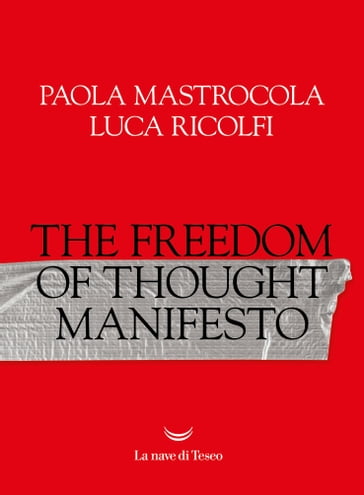
“In a time when political correctness has become the fundamental ideology of the progressive world, it shouldn’t be surprising if censoring any misaligned expression has become a temptation for the left-wing, while fighting against censorship has turned into an unexpected libertarian opportunity for the right. It’s a mistake in both cases. Ideas and behaviors that we don’t like should be fought with other ideas and ways of being, not by preventing others from expressing themselves.”
Who is afraid of freedom of expression? Paola Mastrocola and Luca Ricolfi seek the answer to a question that has insinuated itself into our lives in a dangerous way. Authoritarian censorship of the past has turned into the wildly correct, which bends the language to current trends (from innocent words being put on trial, to surreal “inclusive” neologisms), and into a cancel culture that reinterprets the past with the eyes of today. So, in the jungle of the Internet and on the global pillory that banned humor and dialogue, an intimidating and inquisitorial climate is spreading, imposed by the self-proclaimed guardians of Good. Mastrocola and Ricolfi write about it, identifying its historical causes and presenting solutions, composing a veritable manifesto to restore freedom to the oppressed language of our times.

Paola Mastrocola ha esordito con il romanzo
La gallina volante (2000), vincitore del premio Calvino. Finalista al premio Strega nel 2001 con
Palline di pane e vincitrice del premio Campiello nel 2004 con
Una barca nel bosco, ha pubblicato, tra gli altri,
La scuola raccontata al mio cane (2004),
Che animale sei? (2005),
Più lontana della luna (2007),
La felicità del galleggiante (2010),
Togliamo il disturbo. Saggio sulla libertà di non studiare (2011),
Non so niente di te (2013),
L’esercito delle cose inutili (2015),
La passione ribelle (2015),
L’amore prima di noi (2016) e
Leone (2018). Per La nave di Teseo è uscito nel 2020
Diario di una talpa.

Luca Ricolfi (Torino, 1950), sociologo e docente di Analisi dei dati, ha fondato la rivista di analisi elettorale “Polena” e l’Osservatorio del Nord Ovest. Attualmente è presidente e responsabile scientifico della Fondazione David Hume. Fra i suoi libri:
Perché siamo antipatici? (2005),
Tempo scaduto. Il contratto con gli italiani alla prova dei fatti (2006),
Illusioni italiche (2010),
Il sacco del Nord (2012),
La sfida. Come destra e sinistra possono governare l’Italia (2013),
L’enigma della crescita (2014, 2020),
Sinistra e popolo (2017). Per La nave di Teseo ha pubblicato
La società signorile di massa (2019), vincitore del premio Biella letteratura e industria - Giuria dei lettori e del premio Città di Como - Sezione Saggistica.


 Paola Mastrocola ha esordito con il romanzo La gallina volante (2000), vincitore del premio Calvino. Finalista al premio Strega nel 2001 con Palline di pane e vincitrice del premio Campiello nel 2004 con Una barca nel bosco, ha pubblicato, tra gli altri, La scuola raccontata al mio cane (2004), Che animale sei? (2005), Più lontana della luna (2007), La felicità del galleggiante (2010), Togliamo il disturbo. Saggio sulla libertà di non studiare (2011), Non so niente di te (2013), L’esercito delle cose inutili (2015), La passione ribelle (2015), L’amore prima di noi (2016) e Leone (2018). Per La nave di Teseo è uscito nel 2020 Diario di una talpa.
Paola Mastrocola ha esordito con il romanzo La gallina volante (2000), vincitore del premio Calvino. Finalista al premio Strega nel 2001 con Palline di pane e vincitrice del premio Campiello nel 2004 con Una barca nel bosco, ha pubblicato, tra gli altri, La scuola raccontata al mio cane (2004), Che animale sei? (2005), Più lontana della luna (2007), La felicità del galleggiante (2010), Togliamo il disturbo. Saggio sulla libertà di non studiare (2011), Non so niente di te (2013), L’esercito delle cose inutili (2015), La passione ribelle (2015), L’amore prima di noi (2016) e Leone (2018). Per La nave di Teseo è uscito nel 2020 Diario di una talpa. Luca Ricolfi (Torino, 1950), sociologo e docente di Analisi dei dati, ha fondato la rivista di analisi elettorale “Polena” e l’Osservatorio del Nord Ovest. Attualmente è presidente e responsabile scientifico della Fondazione David Hume. Fra i suoi libri: Perché siamo antipatici? (2005), Tempo scaduto. Il contratto con gli italiani alla prova dei fatti (2006), Illusioni italiche (2010), Il sacco del Nord (2012), La sfida. Come destra e sinistra possono governare l’Italia (2013), L’enigma della crescita (2014, 2020), Sinistra e popolo (2017). Per La nave di Teseo ha pubblicato La società signorile di massa (2019), vincitore del premio Biella letteratura e industria - Giuria dei lettori e del premio Città di Como - Sezione Saggistica.
Luca Ricolfi (Torino, 1950), sociologo e docente di Analisi dei dati, ha fondato la rivista di analisi elettorale “Polena” e l’Osservatorio del Nord Ovest. Attualmente è presidente e responsabile scientifico della Fondazione David Hume. Fra i suoi libri: Perché siamo antipatici? (2005), Tempo scaduto. Il contratto con gli italiani alla prova dei fatti (2006), Illusioni italiche (2010), Il sacco del Nord (2012), La sfida. Come destra e sinistra possono governare l’Italia (2013), L’enigma della crescita (2014, 2020), Sinistra e popolo (2017). Per La nave di Teseo ha pubblicato La società signorile di massa (2019), vincitore del premio Biella letteratura e industria - Giuria dei lettori e del premio Città di Como - Sezione Saggistica.